The marginalisation of the Global South in USA’s most widely covered news programme (ABC World News Tonight)

By Ladislaus Ludescher (Goethe-University Frankfurt on the Main)
In 2022, just around 3% of the airtime of the most widely covered US news programme, ABC World News Tonight, was devoted to the Global South, even though around 85% of the world’s population lives there. The civil war in Yemen, which the United Nations described as the “world’s worst humanitarian crisis”, and the civil war in the northern Ethiopian region of Tigray, which is considered the “deadliest war of the 21st century”, were completely ignored in the news.
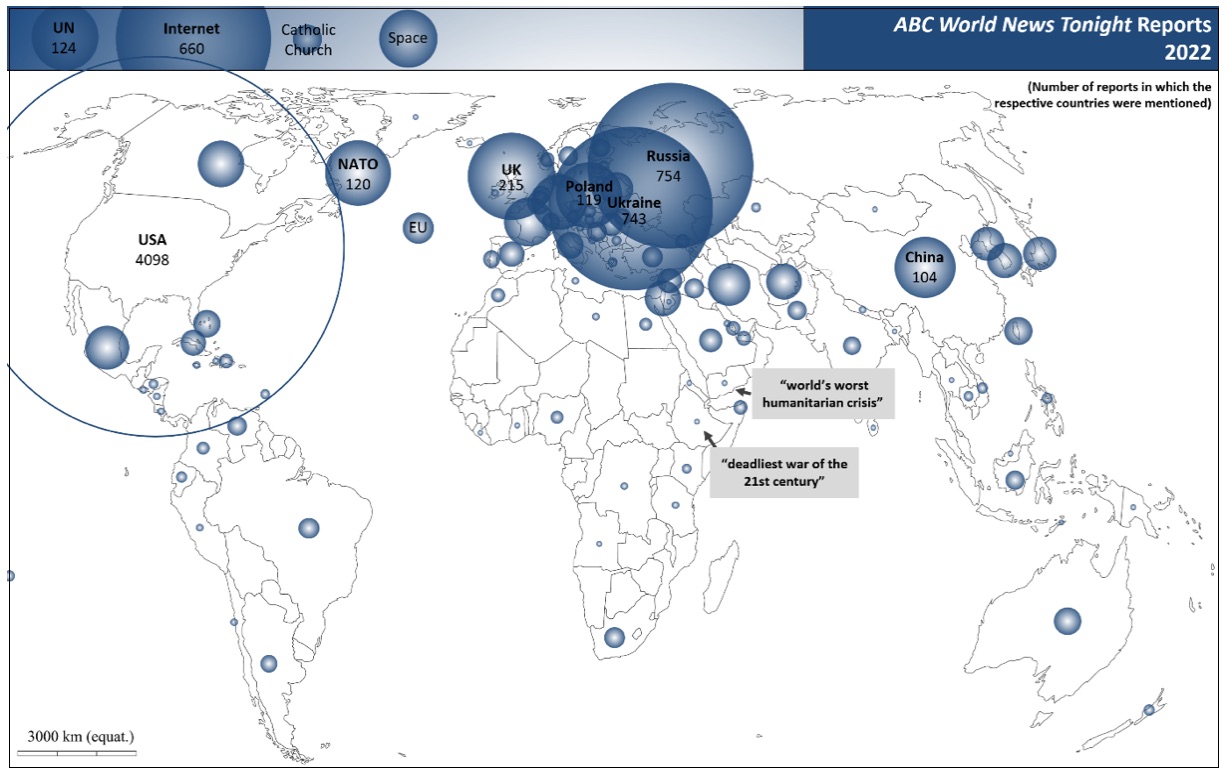
Fig. 1 Number of reports in which the respective countries (or political entities) were mentioned in the ABC World News Tonight in 2022
In 2024, EJO published an article on the coverage of the most important German-language television news programmes in Germany (Tagesschau), Austria (Zeit im Bild [ZIB] 1) and Switzerland (SRF Tagesschau). There is no news format with a comparable leading position (with a market share of 45-60 per cent) in the USA. ABC World News Tonight has the highest ratings among network television news programmes in the United States. In the 2022/23 season, World News Tonight with main presenter David Muir was watched by around 8 million people, putting it ahead of NBC Nightly News and CBS Evening News, which have a similar programme schedule, among the three major main news programmes. This differs from German-language news formats in that the half-hour programmes are interrupted by commercial breaks, among other things. In the case of ABC World News Tonight, which is broadcast daily at 6.30 pm (Eastern Time Zone), the 30-minute programme contains around 12 minutes of advertising. For the present study, 346 editions of World News Tonight in 2022 were analysed, which corresponds to around 100 hours of pure broadcasting time (i.e. without advertising and without intro and outro).

ABC World News Tonight is the news programme with the widest reach on the US networks (Fig. wikimedia.commons)
World News Tonight is characterised to a very large extent by reporting that can be described as “sensational journalism”. The programme takes up numerous tabloid topics. Violent crime (especially murders with firearms), family tragedies, kidnappings, accidents and mishaps are among the recurring themes and largely determine the programmes, which are strongly geared towards emotional impact. Among the top topics are regular reports on natural events such as tornadoes, heavy snowfalls and winter storms (blizzards), wildfires, floods, heat waves and droughts that hit the country and are usually conveyed with great drama.
In general, the programme’s reporting is decidedly American-centric and clearly oriented towards domestic issues. While the German and Swiss Tagesschau and the Austrian Zeit im Bild devoted between 42% and 45%of their broadcasting time to their own countries in 2022, the figure for ABC World News Tonight was around 75% (Fig. 2). The rest of the Global North accounted for around 22% and the entire Global South for only around 3% (in the German-language news it was around 10% in each case).
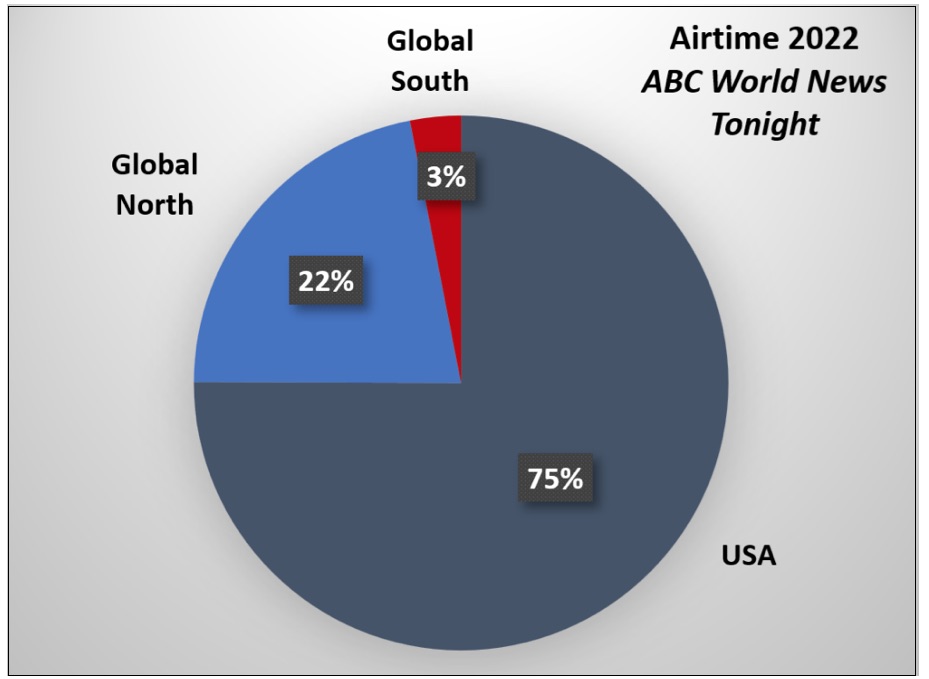
Fig. 2 Geographical distribution of airtime on ABC World News Tonight in 2022
Within the Global South, there is also a concentration of attention on the countries of the MENA region (MENA = Middle East and North Africa) and China. Excluding these two geographical areas, World News Tonight only devoted around one per cent of its broadcasting time to the rest of the Global South.
The fact that this is not an exception but the rule among the major US news programmes is suggested by the results of an earlier study of the CBS Evening News for 2015.
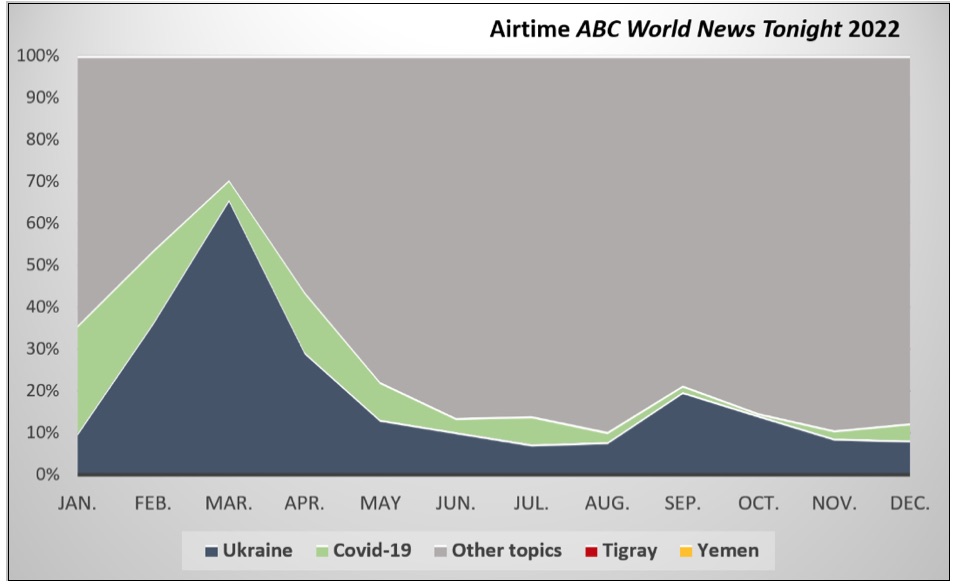
Fig. 3 Distribution of airtime by topic on ABC World News Tonight in 2022
(The data curves for the civil war regions of Tigray and Yemen cannot be displayed as they were not covered)
As in other news organisations in the Global North, the Ukraine war dominated reporting in spring 2022. Compared to the leading German-language news programmes, however, interest in the Ukraine war and its effects (especially in the energy sector) declined much faster in the USA, which is likely to be related to the greater geographical distance, but also in particular to the high dependence of European countries on Russian gas supplies (Fig. 3). Overall, around 19% of the total reporting time of World News Tonight in 2022 was devoted to the war in Ukraine and its effects (in the German and Swiss Tagesschau it was around 39% and 32% respectively, in ZIB 1 around 33%).
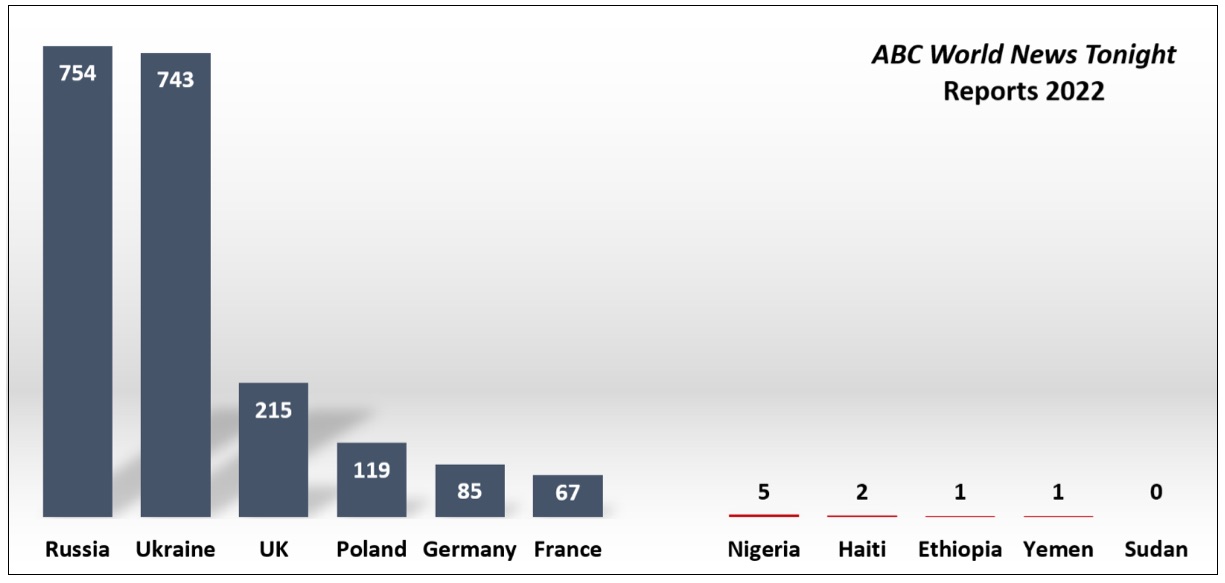
Fig. 4 Number of reports in which selected countries were mentioned on ABC World News Tonight in 2022
Events with far-reaching social consequences in the Global South went largely unnoticed. This applies, for example, to the double coup d’état in Burkina Faso in 2022, the economic collapse and political crisis in Sri Lanka, as well as the political crisis and nationwide state of emergency in Peru. Also the “unprecedented floods” in Pakistan, which left around 33 million people homeless, and even the dramatic socio-political situation in Haiti, which is “on the verge of an abyss” and is geographically closer to the United States than the US territory of Puerto Rico, were almost completely ignored in the news.
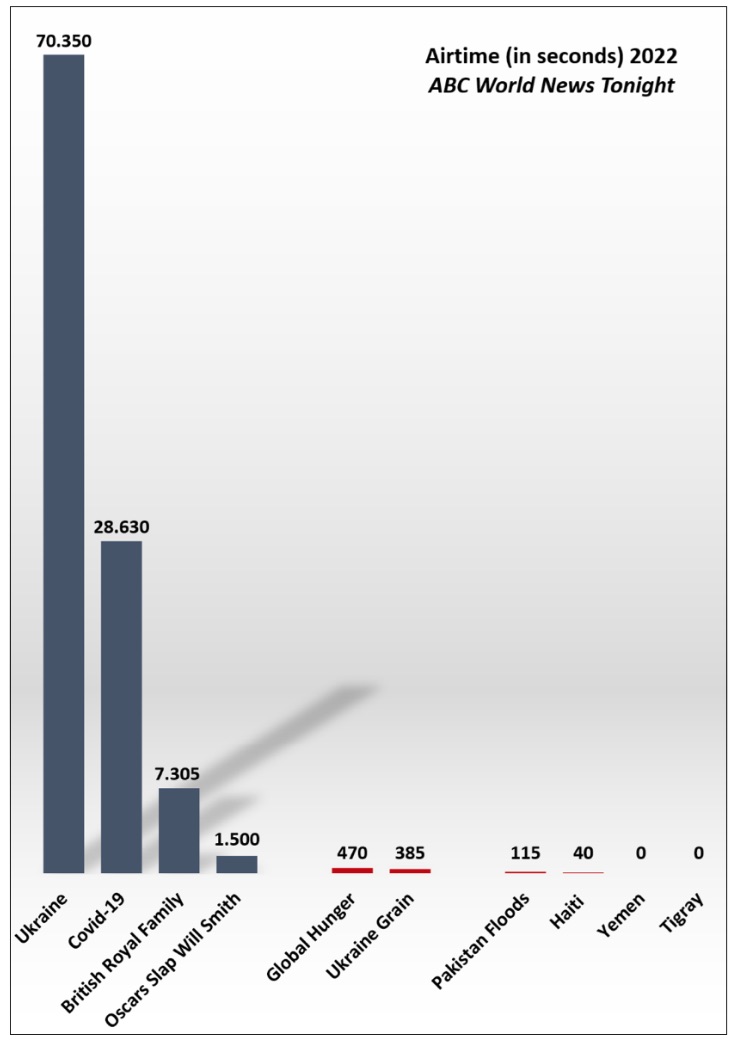
Fig. 5 seconds of airtime on ABC World News Tonight for selected topics in 2022
This also applies to global food insecurity, which has increased significantly due to the effects of the coronavirus pandemic and the war in Ukraine. According to the United Nations World Food Report, the number of hungry people rose to up to 828 million in 2021, an increase of around 150 million people compared to the pre-pandemic period.
In contrast, the topic of global hunger was marginalised even more on ABC World News Tonight than in the German-language media, where it already played only a very minor role. Even the restricted export of grain in connection with the war in Ukraine only generated a very limited amount of interest and was outstripped by numerous tabloid topics (Fig. 5). With a total of around 855 seconds of airtime, the hunger issue, for example, was only covered about half as much as the slap Will Smith gave Chris Rock at the Oscars. The British royal family even received around 8 times more coverage than hunger worldwide.
Journalist Matt Gutmann, who joined the programme from Kenya on 11 May 2022, reported on the desolate hunger situation and in this context also recalled the great famine in the Horn of Africa in 2011, when over a quarter of a million people (more than half of them children under the age of five) died there. In conversation with presenter David Muir, he pointed out that the current focus on the war in Ukraine and the Covid-19 pandemic was threatening to reduce the willingness to donate to aid organisations working to combat hunger. He explained:
David, aid groups telling me they are bracing for a famine here worse than the one here in 2011 in which more than 250,000 people died. They say it’s not that the drought is that much worse this time, it’s that with the war in Ukraine and with Covid, donor attention is elsewhere, so they lack the ressources to keep people alive. (Matt Gutmann. In: ABC World News Tonight. May 11, 2022, Min. 16.)
Media attention for global hunger would be of the utmost importance, especially in order to initiate a broad political discourse that could lead to a solution to the problem. The United Nations World Food Programme (WFP) describes global hunger as “the world’s largest solvable problem”, as both the resources and the technical possibilities are available and comparatively little funding would be required to solve this problem. However, this fails due to a lack of political will, which is also difficult to mobilise due to a lack of public interest and media attention, condemning the issue to subordinate status on the agenda.
The culmination of the marginalisation of issues from the Global South on ABC World News Tonight in 2022 was the complete ignoring of the civil wars in Yemen and Ethiopia. In Yemen, where Houthi rebels have been fighting the government since 2014, over 377,000 people had died by the end of 2021. The United Nations described the situation in the country as the “world’s worst humanitarian crisis”. To date, more than 23 million people (half of them children), around two-thirds of the population, are dependent on humanitarian aid. The humanitarian situation in the northern Ethiopian region of Tigray is also extremely tense. With an estimated death toll of up to 600,000, the military conflict there from 2020 to 2022 is considered the “deadliest war of the 21st century”. On ABC World News Tonight, Yemen and Ethiopia were only mentioned en passant in two reports in other contexts. In the entire year, not a single contribution was made to the “world’s worst humanitarian crisis” and the “deadliest war of the 21st century” was broadcast.
The ABC World News Tonight does not live up to its title claim of presenting world news. The title of the programme can be described as misleading for the year 2022. With a share of around 3% of the total broadcasting time of the reports, the Global South, where around 85% of the world’s population live, borders on media non-existence in the reporting of the US news programme with the widest reach.
Further research results can be found here on the German-language EJO pages or here in an English-language “Google Translate” translation.
The original study (in German) “Vergessene Welten und blinde Flecken” (Forgotten worlds and blind spots), which analysed over 5,500 issues of the German “Tagesschau” news programme, as well as various supplementary analyses of German-language media, can be viewed and downloaded free of charge at www.ivr-heidelberg.de
The site also includes a petition, video summaries and information on a travelling exhibition based on the research.
Opinions expressed on this website are those of the authors alone and do not necessarily reflect or represent the views, policies or positions of the EJO or the organisations with which they are affiliated.
If you liked this story, you may also be interested in: Interview: Self-censorship and untold stories in Uganda.









































